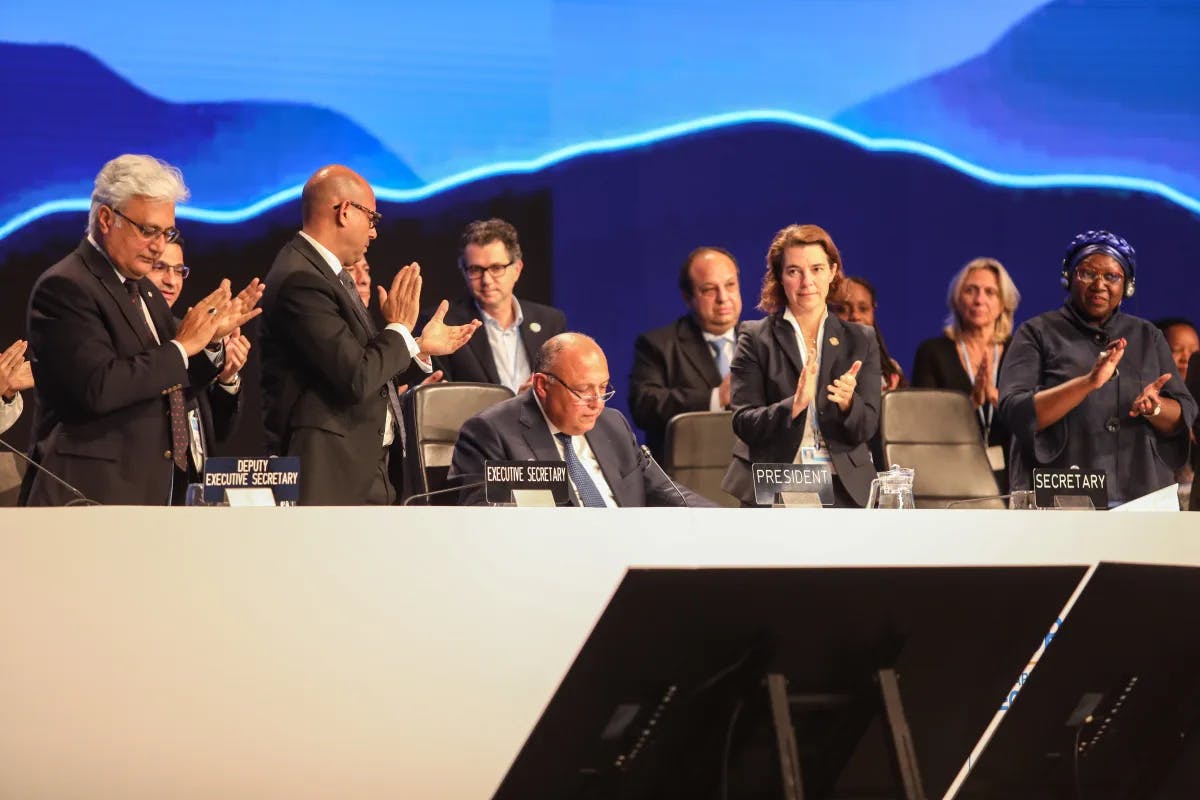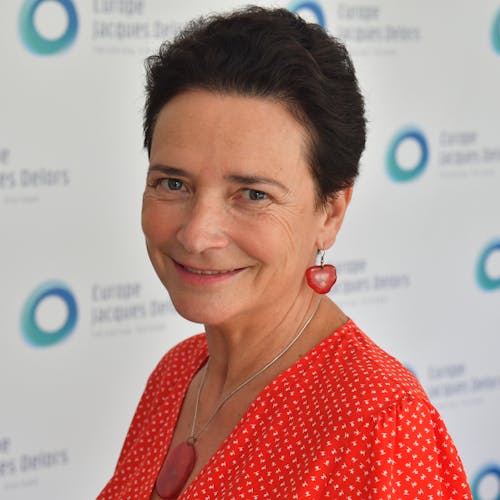A contrasted COP: Historical progress on Loss and Damage - Irresponsible stagnation on emissions reduction
COP27 wrapped up in the early hours of Sunday, 20 November. The agreement package is a mixed bag. It is comparable to a Magritte painting. Nice picture of a global climate agreement, but looking closer between the lines, one could almost read: “Ceci n’est pas un accord sur les énergies fossiles”... The absurdity of the scene in this instance being to try to address climate change globally, without committing to reducing the use of fossil fuels, or to (clearly) phasing out fossil fuel subsidies…
Here are Europe Jacques Delors’ seven main takeaways after COP27:
A battle won for Climate Justice
The Egyptian COP however managed to strike a historical agreement on the creation of a special fund for Loss and Damage. After more than 30 years of endless negotiating rounds, the EU’s proactive diplomatic efforts in Sharm-El-Sheikh helped breaking the deadlock. The text provides for the creation of a fund for "particularly vulnerable" developing countries without creating any legal liability for the developed countries – which means certain emerging economies like the BRICS could be encouraged to participate financially. All the operational details are due to be finalised by COP28 – and one can hope to see the fund operating as early as next year. Adaptation is another issue on which developing countries fought and, arguably, won. Developed countries did not backtrack on what they promised in Glasgow: to double the financial resources allocated to adaptation. Moreover, several developed economies made new pledges to the Adaptation Fund.
A regrettable status quo on mitigation
Countries did not reach an agreement on stronger wording for cutting emissions and phasing out fossil fuels due to the resistance of a few oil and gas-producing countries. A proposal tabled by India and supported by the US, the EU and the UK called for “phasing out” all fossil fuels. But this ambitious effort clashed against the stubborn opposition of Russia, Saudi Arabia and Iran. The final text calls upon parties to reduce emissions through the uptake of “low-emissions energy” (cover decision – III. 10), an umbrella term under which natural gas can be placed. Another worrying sign is the absence of a stronger commitment to keep the 1.5 C target alive. The Nationally Determined Contributions (NDCs) submitted by the parties do not put us on the trajectory to achieve this goal. Moreover, the EU has not obtained a commitment to peak global emissions by 2025, an unavoidable milestone if we want to limit the increase of world temperature to 1.5 C.
Sharm-El-Sheikh was ‘open doors’ for Fossil Lobbyists...
The Egyptian Presidency has been largely criticized for having allowed the fossil fuel industry to have such a great influence on the negotiations. “The presence of fossil fuel lobbyists reached an all-time high at COP27. It is imperative to fight back against this tendency ahead of COP28 in Dubai” notes EJD’s Director General Geneviève Pons. Similarly, the Egyptian government has been condemned for how it treated many activists and journalists and for its blatant disregard of freedom of speech and manifestation.
Just Transition Partnerships: a promising pathway
On a more positive note, the proliferation of Just Transition Partnerships (cover decision - III. 8) represents a promising step towards the decarbonization of the energy sectors in many developing countries. Through these deals rich countries finance the greening of the energy sector in emerging economies. While South Africa outlined the details of its pioneering plan for moving away from coal, Indonesia signed a similar agreement on the sidelines of G20. Similar projects are in the pipeline for Vietnam, Senegal and Egypt. They are an illustration of what plurilateralism can achieve when multilateralism pains to advance.
Pleas for systemic reform of the international financial system
It may have flown under the radar, but the final text calls also for an all-encompassing reform of the international financial system and the multilateral development banks. Barbadian PM Mia Mottley’s Bridgetown Initiative proposes a systemic reform of the IMF and the World Bank and urges these institutions to prioritise climate-compatible development.
Agriculture and Trade climbing higher in COP’s agenda
We welcome the fact that the parties explicitly recognised the link between climate change and food security. For the first time, the COP hosted several pavilions focusing on food systems and agriculture. It was about time! The topic has been left outside of climate negotiations for too long. With the Egyptian COP presidency making agri-food one of the priorities of this year’s conference, COP27 was an opportunity to bring food systems into the climate agenda. The decision of the Koronivia joint work on agriculture, launched in 2017, to establish a four-year work programme on the implementation of climate action on agriculture and food security shows the right intentions. On the downside, however, despite the talks about food systems as a whole, the initiative remains focused on agriculture alone, leaving all other value chain actors out of the scope and foregoing the opportunity to advocate for and promote a systemic approach to food security and climate action in this field.
The presence of World Trade Organisation (WTO)’s Director General Dr. Ngozi Okonjo-Iweala, and the organisation of a WTO panel on trade and climate in the first days of the COP also marks a step forward towards the recognition of the importance of trade policies and international trade negotiations to fight climate change.
An encouraging step towards the mainstreaming of ocean protection in climate discussions
Ocean also had its own COP Pavilion for the first time, hosting events and discussions on the ocean's role in climate mitigation.
I warmly welcome the work of the organizers and ocean stakeholders for hosting the first-ever Ocean Pavilion in COPs History! We should double down on our efforts to mainstream oceans’ importance in climate mitigation at COP28. Ocean has a pivotal role to play, thus requiring much more attention, engagement of Parties in international discussions and public and private investments
We also warmly welcome and support French President Emmanuel Macron’s call for a ban on Deep Sea Mining.
This is a strong intervention in support of long time requests from NGOs against deep sea mining. The purpose of exploration must be ecosystems knowledge and preservation




